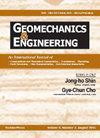Deformation behavior analysis of tunnels opened in various rock mass grades conditions in China
IF 2.4
3区 工程技术
Q2 ENGINEERING, CIVIL
引用次数: 3
Abstract
The [BQ] method is a rock mass classification method to evaluate the quality of the rock mass and determine the construction parameters. This method is more empirical and cannot provide predictions for the deformation of tunnels after excavation. To predict the surrounding rock deformation of deep-buried tunnels by using the [BQ] method in China, first, data of 52 tunnels were collected and analyzed to determine the relationship between the grades of the surrounding rock, excavation method, burial depth, tunnel span, and surrounding rock deformation. Second, the equivalence of different surrounding rock grades to the range of geological strength index (GSI) scores were determined using methods, such as fitting GSI to another classification system RMR and RMR to BQ, and considering the correction factors of BQ values. This approach provides the basis for theoretical calculations based on the Hoek–Brown strength criterion. On the basis of the Hoek–Brown strength criterion, a theoretical approach to the deformation of surrounding rock under three failure models, namely, elastic–brittle–plastic, strain-softening, and elastic-perfectly-plastic, is presented when considering the installation time of primary support and the volumetric force of bolts. Finally, the theoretical approach is analyzed and compared with the measured data to verify its feasibility. Moreover, the effects of burial depth, grades of surrounding rock, support parameters, support time, and deformation allowance of the surrounding rock are analyzed. Analysis results can provide some guidance for the prediction of surrounding rock deformation of deep-buried tunnels in China.中国不同岩体等级条件下隧道开挖变形特性分析
[BQ]法是一种评价岩体质量和确定施工参数的岩体分类方法。这种方法比较经验性强,不能对隧道开挖后的变形进行预测。为了利用[BQ]法对中国深埋隧道围岩变形进行预测,首先对52条隧道的数据进行收集和分析,确定围岩等级、开挖方式、埋深、隧道跨度与围岩变形之间的关系。其次,采用GSI拟合另一分类体系RMR、RMR拟合BQ、考虑BQ值修正因子等方法,确定不同围岩等级与GSI评分范围的等价性;该方法为基于Hoek-Brown强度准则的理论计算提供了依据。在Hoek-Brown强度准则的基础上,提出了考虑主支护安装时间和锚杆体积力的弹-脆-塑性、应变-软化和弹-完全塑性三种破坏模式下围岩变形的理论分析方法。最后,对理论方法进行了分析,并与实测数据进行了比较,验证了理论方法的可行性。分析了埋深、围岩等级、支护参数、支护时间、围岩变形余量等因素对支护效果的影响。分析结果可为国内深埋隧道围岩变形预测提供一定的指导。
本文章由计算机程序翻译,如有差异,请以英文原文为准。
求助全文
约1分钟内获得全文
求助全文
来源期刊

Geomechanics and Engineering
ENGINEERING, CIVIL-ENGINEERING, GEOLOGICAL
CiteScore
5.20
自引率
25.00%
发文量
0
审稿时长
>12 weeks
期刊介绍:
The Geomechanics and Engineering aims at opening an easy access to the valuable source of information and providing an excellent publication channel for the global community of researchers in the geomechanics and its applications.
Typical subjects covered by the journal include:
- Analytical, computational, and experimental multiscale and interaction mechanics-
Computational and Theoretical Geomechnics-
Foundations-
Tunneling-
Earth Structures-
Site Characterization-
Soil-Structure Interactions
 求助内容:
求助内容: 应助结果提醒方式:
应助结果提醒方式:


